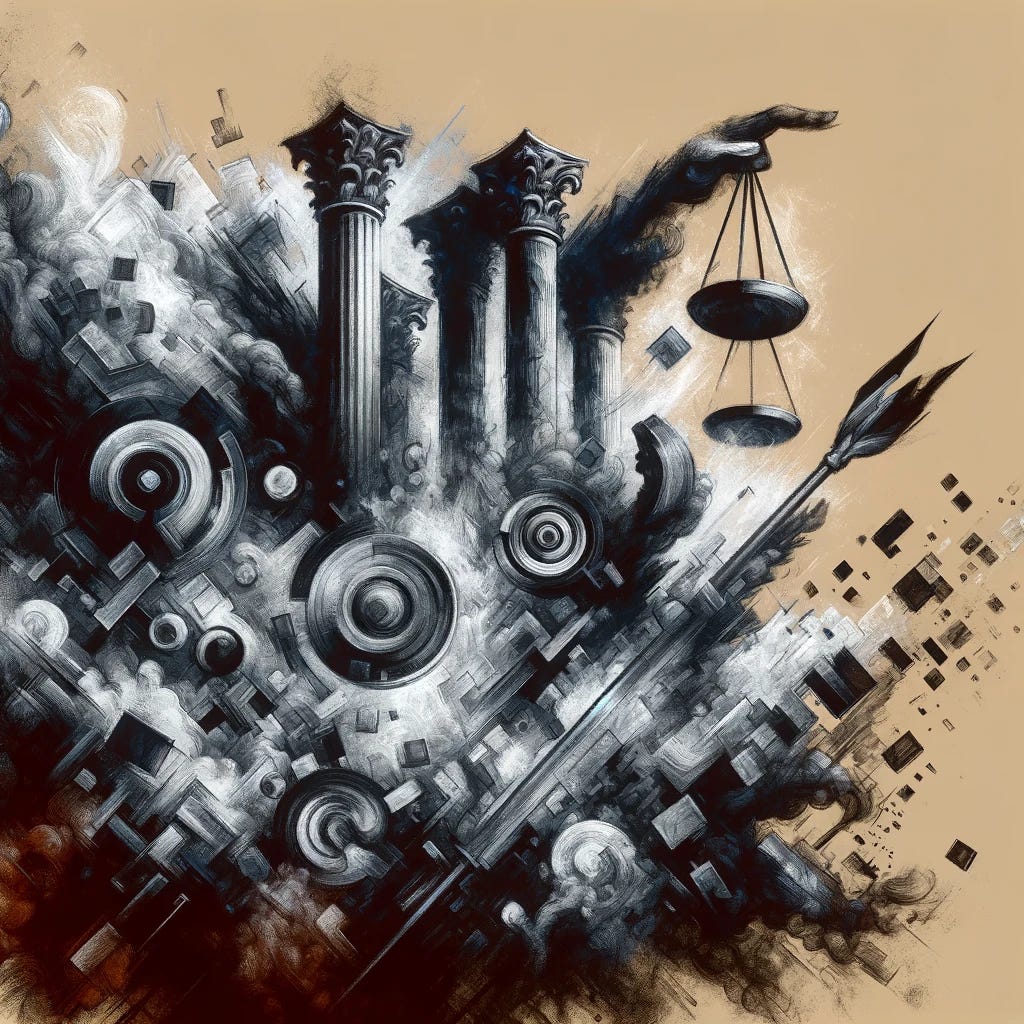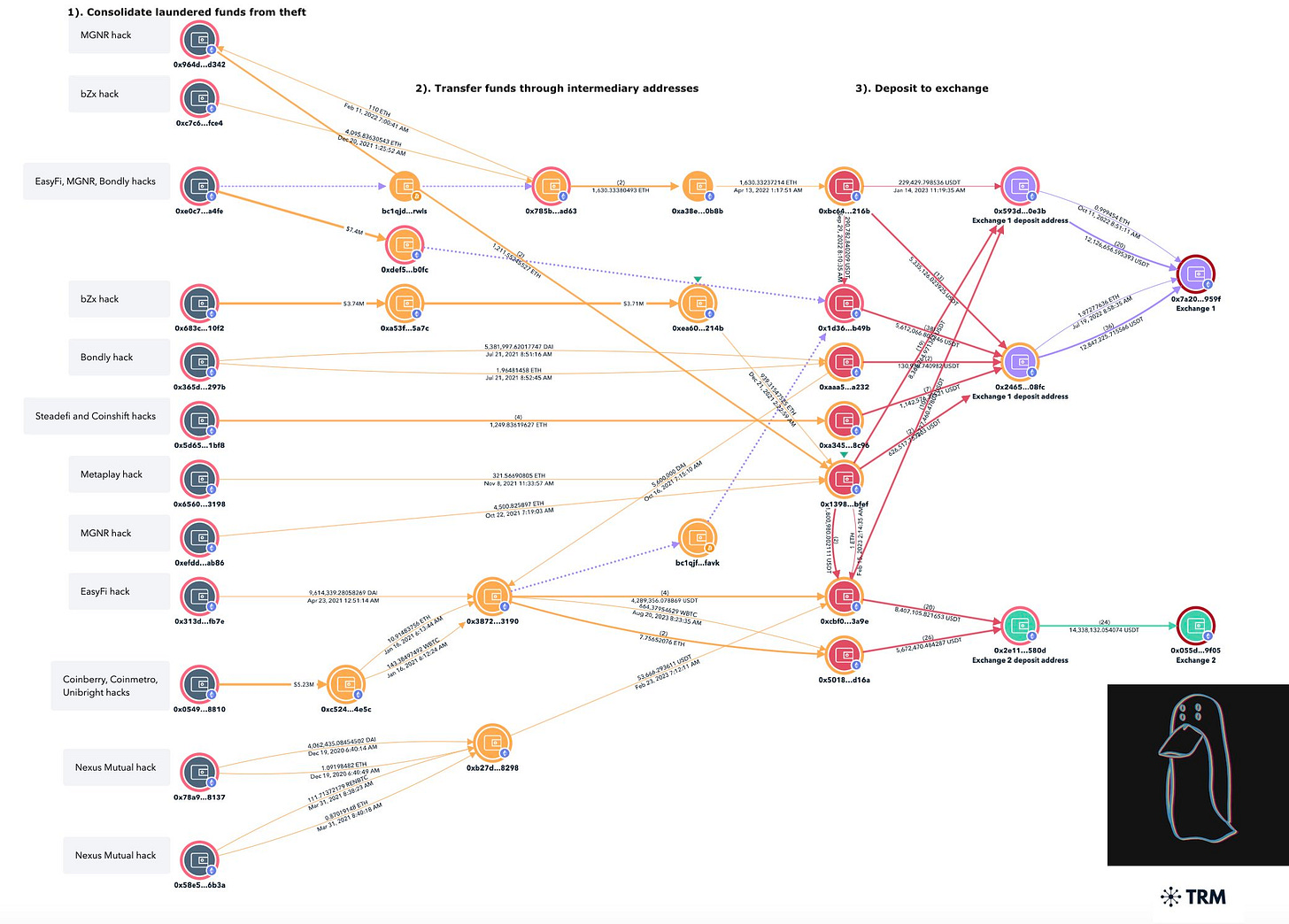LexNews+ Weekly No. 13
SEC v. Consensys and Uniswap; Avi Eisenberg Trial; ZachXBT's Lazarus Group Expose; The Future of AI Innovation Act; and more! Here's what happened the last few weeks of April.
Sections:
1. Headlines (The top stories in cryptolaw this week)
2. Podcasts
3. LexDAO weekly updates
4. Closing Statements
Headlines
1. SEC vs Consensys
Kyler
In a landmark lawsuit that underscores a growing battle between regulators and the crypto industry, Consensys, a pivotal component and supporter of the Ethereum network, has taken a stand against the U.S. Securities and Exchange Commission (SEC). Filed in a Texas court, the suit argues that the SEC is overstepping its bounds by attempting to regulate Ethereum (ETH) as a security, despite previous assertions by the agency that ETH does not meet the criteria of a security and falls outside its jurisdiction.
This legal challenge is part of a broader industry trend where U.S. crypto entities are increasingly willing to confront what they perceive as excessive regulatory actions. Companies like Coinbase and Kraken have similarly initiated legal battles seeking clarity on critical crypto law issues, while organizations such as the Blockchain Association have targeted specific regulatory definitions that could significantly impact the industry.
Consensys' lawsuit is particularly significant due to the SEC's historical stance on Ethereum. In 2018, then SEC Director William Hinman publicly stated that ETH was not a security, a position seemingly reaffirmed in 2021 when ETH futures were launched under the oversight of the Commodities Futures Trading Commission (CFTC). This backdrop makes the SEC's current actions appear as a sharp reversal, potentially setting the stage for a supreme legal showdown that could reach the U.S. Supreme Court.
"The case we have filed today is intended to preserve access for the thousands of developers, market participants, and institutions who have a stake in the world's second-largest blockchain," stated Joe Lubin, Ethereum co-founder and CEO of Consensys.
"The SEC cannot be allowed to arbitrarily expand its jurisdiction."
The lawsuit not only challenges the classification of ETH as a security but also contests the definition of popular Ethereum wallets like MetaMask as brokers, which would subject them to stringent regulatory requirements. Furthermore, it seeks to protect developers from what Consensys views as unjustified legal threats by the SEC, which has intensified its scrutiny of the Ethereum network and its contributors.
Legal experts and industry observers are closely watching this case as it could have far-reaching implications for the governance of digital assets and the application of securities law in the rapidly evolving crypto landscape. The outcome could influence how decentralized technologies are developed, deployed, and regulated in the United States, potentially establishing a precedent for how other cryptocurrencies are treated by regulatory bodies. "This Consensys lawsuit is a really big deal…
…they’re positioning themselves to challenge the SEC’s authority to regulate crypto,"
notes Brian Frye, a University of Kentucky law professor. The strategic filing in the 5th Circuit, known for its conservative leanings against government regulation, suggests that Consensys is preparing for a protracted legal fight, possibly aiming for a decision that could redefine the regulatory framework for cryptocurrencies in America.
Sources:
CoinDesk - Consensys Sues SEC Over ‘Unlawful Seizure Of Authority’ Over Ethereum
Court Listener - Consensys Software Inc., v. Gary Gensler, Chair of the U.S. Securities and Exchange Commission: Complaint for Declaratory and Injunctive Relief
CoinDesk - Consensys, a Target for the SEC’s Assault on ETH, Is Fighting Back
2. SEC Serves Uniswap Wells Notice
Uni finally gets invited to the big dance.
Miner
On April 10, Uniswap Labs—the company behind popular DeFi protocol Uniswap and its accompanying $UNI token—revealed they had received a Wells notice from the Securities and Exchange Commission (SEC). Such notices typically precede formal enforcement actions and inform SEC targets as to the nature of any potential complaints lodged against them.
Following the SEC’s action, Uniswap CEO Hayden Adams took to X (formerly known as Twitter) where he declared he is:
“ready to fight.”
Other Uniswap executives confirmed the SEC is investigating the company for acting as an unregistered broker and securities exchange.
Uniswap Labs also addressed the issue in a recent blog post criticizing the Wells notice as the SEC’s latest salvo in an ongoing “political effort to target even the best actors building technology on blockchains” while simultaneously failing to provide a clear path to registration for those operating lawfully in the US.
The blog post goes on to discuss legal developments in favor of its defense and cites recent seminal blockchain rulings such as those in SEC v. Coinbase, Inc. and SEC v. Ripple.
A spokesperson for the SEC refused to comment on the matter at this time.
For more on this case, here is Hayden Adams from Uniswap offering his thoughts on the Bankless podcast:
Sources:
Uniswap Blog - Fighting for DeFi
CoinDesk - DeFi Exchange Uniswap Receives Enforcement Notice From the SEC
3. Avi Eisenberg trial
a “successful, legal” strategy
Kyler
In New York, the trial of crypto trader Avi Eisenberg, accused of a $110 million fraud that destabilized Mango Markets, a decentralized finance (DeFi) platform on the Solana blockchain, has commenced.
Eisenberg, who described his actions in October 2022 as a
"highly profitable trading strategy,"
allegedly manipulated the price of the MNGO token used on Mango Markets, borrowing heavily against artificially inflated token values to extract $110 million in various cryptocurrencies. The funds were originally deposited by other users on the platform. Although Eisenberg later returned some of the money in exchange for a non-prosecution agreement from Mango's backers, the deal unraveled, leading to this high-profile trial.
The courtroom drama will pivot on the interpretation of complex crypto trades and whether these can be deemed straightforward fraud. The government's approach reflects an evolving strategy to police the DeFi sector, where the mantra "code is law" prevails and traditional regulatory mechanisms are often sidelined by the autonomous nature of smart contracts. As noted by our friend Gabe Shapiro on twitter:
Key testimony is also expected from Mango's founder, Dafydd Durairaj, who, according to prosecutors, sought the help of a ransomware negotiator following the trade.
The trial will delve into the semantics of "manipulation" and the obligations of traders on decentralized platforms, probing the ethical and legal constraints of actions executed via smart contracts. This landmark case not only challenges Eisenberg's individual actions but also tests the resilience of regulatory frameworks in grappling with the novel and complex nature of decentralized finance. As the trial unfolds, it could set significant precedents for how similar cases are approached in the future.
4. How North Korea’s infamous Lazarus Group laundered $200M+ from 2020-2023
A summary of @ZachXBT’s analysis as recently published on Mirror here
Kyler
In a meticulously researched expose, renowned whitehat researcher ZachXBT unravels the nightmarish cat’s-cradle of financial threads and crumbs telling the story of North Korea's notorious Lazarus Group, and their laundering of over $200 million from more than 25 crypto-exploits between 2020 and 2023.
This painstaking 15 month investigation tracked the sophisticated maneuvers of the hackers, as they shifted illicit funds through a labyrinth of blockchain pathways, ultimately converting them into fiat currency via peer-to-peer (P2P) marketplaces.
ZachXBT's analysis reveals that Lazarus Group, also known as APT38 or Bluenoroff, has evolved from high-profile traditional cyber heists, such as the 2014 Sony Pictures hack and the 2016 $81 million Bangladesh Bank heist, to sophisticated cryptocurrency thefts targeting exchanges and even individual wallets. The group's pivot to crypto is characterized by its use of ever-evolving tailor-made malware and phishing schemes to access private keys and wallet addresses of unsuspecting victims.
Zach’s research carefully documents several incidents, such as the theft from Canadian exchange CoinBerry, the Nexus Mutual founder Hugh Karp, and the shocking compromise of the Bondly finance CEO's hardware wallet. Each incident is dissected to reveal a pattern of moving stolen assets through intermediary wallets, using services like Tornado Cash to obscure the origins, before finally converting the cryptocurrencies into USDT and other stablecoins on platforms like Paxful and Noones.
Zach underscores the sophistication of these operations poignantly:
"The Lazarus Group's methods are a cat-and-mouse game with law enforcement and cybersecurity experts. Each hack not only funds their regime but also refines their techniques for the next."
This highlights the iterative nature of their strategies and the challenges in curbing their activities. Here are some images detailing the tracing:
From a cryptolaw perspective, these incidents underscore a dire need for either enhanced regulatory frameworks that target actual bad actors and can adapt to the rapid evolution of cybercrime in the blockchain space, or a dedicated use of undustry expertise and capital to create our own defenses, such as the newly inaugurated SEAL 911 team.
Furthermore, the implications for cybersecurity are profound. Each hack serves as a case study for the vulnerabilities within smart contracts, wallet security, and the human elements of crypto operations. You wanted edge testers? You got them, anon. Now we know where the systems break — now we need to fix them.
We extend our heartfelt gratitude to ZachXBT and his team for their diligent and insightful work in shedding light on these critical issues. Their relentless pursuit of transparency and understanding in the complex world of cryptocurrency fraud not only educates but also safeguards the community against future threats. Thank you, Zach, for actually caring, and for your unwavering commitment to truth and security.
5. The Future of AI Innovation Act
Kyler
The U.S. Senate is gearing up to intensify America's role in artificial intelligence (AI) development through the proposed "Future of AI Innovation Act," a bipartisan initiative aimed at boosting private sector engagement in federal AI innovation projects.
The act, cosponsored by a diverse group of senators including Todd Young (R-Ind), Maria Cantwell (D-Wash.), Marsha Blackburn (R-Tenn.), and John Hickenlooper (D-Colo.), outlines a strategic push to establish the U.S. as a frontrunner in the AI innovation race. The bill mandates increased federal support for the National Institutes of Standards and Technology (NIST) to develop standards in crucial technological domains, initiate an AI testbed competition managed jointly by NIST and the Department of Energy’s National Laboratories, and form international alliances to create a global consensus on AI standards.
A key feature of the proposed legislation is its call for the Department of Commerce, the State Department, and the White House Office of Science and Technology Policy to spearhead efforts in international cooperation. Additionally, the bill tasks the Government Accountability Office and the National Science Foundation with identifying barriers to AI application within federal operations and promoting initiatives for private sector engagement, respectively.
Senator Young emphasized the significance of the bill in a press release, stating, “The Future of AI Innovation Act is critical to maintaining American leadership in the global race to advance AI. This bipartisan bill will create important partnerships between government, the private sector, and academia to establish voluntary standards and best practices that will ensure a fertile environment for AI innovation while accounting for potential risks.”
Echoing this sentiment, Senator Cantwell highlighted the potential benefits of the legislation: "Our bill ensures the United States will lead on AI for decades to come. It promotes public-private collaboration to drive innovation and competitiveness. The NIST AI Safety Institute, testbeds at our national labs, and the grand challenge prizes will bring together private sector and government experts to develop standards, create new assessment tools, and overcome existing barriers."
The bill is young, and it remains to be seen how it will be received by accelerationists and decelerationists.
Sources:
US Senate - The Future of AI Innovation Act
NextGov - Senate bill aims to bring more private sector participation to federal AI innovation
Luiza Jarovsky - Twitter Thread
Podcasts
Too tired to read, anon? We feel that. Try these instead:
LexDAO weekly:
Bi-weekly Governance Updates
Updates and agendas for all things LexDAO can be found in the Governance Agenda Document
Discussion Topics: How should we handle the volatility of OP contributor payments?
Potential solution: Contributor payments can be swapped from OP to a stablecoin within the designated multisig.
Providing funding for a new Journal of Legal Engineering project
Project is led by Kyle Smith (Bestape) and is seeking between $1500-$3000 to build out their platform. The idea for the journal originated from Creative Commons, and the project would be managed by the LexClinic or the Comms committee (TBD). The journal would be published bi-annually and be “Presented by LexDAO”.
There is some deliberation as to licensing and IP ownership.
Discussion surrounding our upcoming USPTO hackathon. Dr. Llau is organizing. This hackathon will be crucial to our LexDAO branding moving forward.
Discussion of potential 6079.ai partnership
Project is led by Mason, and will also have help from Andres and Anthony.
This partnership is at no cost to LexDAO, and is really an osmosis of members between organizations.
Discussion of consolidating the Discord channels AKA “Spring Cleaning”
Discussion of revision of Comms process and / or committee structure
Upcoming Events
Safe Harbor Legal Engineering Summit
Along with Vitalia.city and Ixian.tech, LexDAO successfully co-hosted the first safe harbor legal engineering summit. At the summit, we explored practical solutions the sandbox sovereign and polycentric legal innovation approach offers to industry.
I was very happy I got to organize a library sciences panel. I feel law librarians are an unrecognized but incredibly important branch of the legal profession – ripe to bridge computer scientists with legal engineers and all the other types of legal professionals.
The livestream recording is here. There will be edited versions in the near future.
May 2nd-5th: Farcon 2024
Farcaster’s summit will take place in Venice Beach, CA, and will feature:
a 1 day summit
a 3 day hackathon
and tons of side events
LexDAO side events are in the works! Stay tuned for more information as the event approaches.
May 10th: LexDAO Hackathon Series
LexDAO OG Dr. Llau is organizing a series of hackathons to ensure we complete our USPTO applications before our extension deadline! This is crucial work (existential, really) for the DAO’s “LexDAO” branding, and we look forward to wide participation for these events.
“We are calling our guild of legal engineers and allies to crowdsource a response. This is an excellent opportunity to practice your argumentative skills as its is an administrative appeal without the pressure of a court case. We have previously submitted joint commentary to the Wyoming legislative committees and your name will be attached to the public record at USPTO to show off your ability. As the main goal is to gather evidence (specimens) and craft an argument, it is suited for non-lawyers to get taste of how appeals are written.”
In addition we will be hosting a number of events to demonstrate law as public good:
reprise of the Wyoming DUNA study session;
announcements by the Communications committee;
Birds of a Feather session to compare machine learning for legal engineers.
Please contact @paolo (PM Gangi) if you wish to give a brief talk about any side-projects. Cut off dates are:
Weds May 8th for Mentors (@drllau) and nominated talks;
Thu May 9th for responding to the Request for Quote as participants
Fri May 10th as guests to observe hackathon (limits on sound stage)
2024 Membership Updates
Work-for-membership 2024 is live! If you’re interested in contributing to earn your 2024 LexDAO membership, reach out to Kyler or Cimply.
We will be announcing a digital meet up for new members soon!
Study Group Updates
We recently hosted a very educational study group on DAO Entity formation in the Marshall Islands!! The event took place on Google Meet on April 30, at 10:30 am PT.
Speakers:
Moderator: Paulo Gangi is the director of the LexDAO Study Group, and the founder of Studio Legale Gangi, a Rome-based law firm.
Panelist: Adam Miller is a Web3 entrepreneur, and the founder of MIDAO.
Panelist: Tatyana Cerullo has over 15 years of experience as the managing member of Marshall Islands Lawyers LLC, where she practices maritime and corporate law.
Panelist: Laura Cole is an attorney and director of business development at Industria Business Lawyers LLP.
Panelist: Pablo Moncada is the founder of MoonDAO and has previously been involved in such projects as Constitution DAO and Junto as well.
Deeper summary coming soon!
Closing Statements
We want to hear from you:
If you enjoyed what you read today, subscribe to receive the weekly publication and give the authors a follow on Twitter for live updates throughout the week. Additionally, consider becoming a member of LexDAO! There’s no better time than now, join our discord and ask about discount and Work-for-Membership opportunities before they run out!
Law is a public good.
██╗░░░░░███████╗██╗░░██╗██████╗░░█████╗░░█████╗░ ██║░░░░░██╔════╝╚██╗██╔╝██╔══██╗██╔══██╗██╔══██╗ ██║░░░░░█████╗░░░╚███╔╝░██║░░██║███████║██║░░██║ ██║░░░░░██╔══╝░░░██╔██╗░██║░░██║██╔══██║██║░░██║ ███████╗███████╗██╔╝╚██╗██████╔╝██║░░██║╚█████╔╝ ╚══════╝╚══════╝╚═╝░░╚═╝╚═════╝░╚═╝░░╚═╝░╚════╝░


















